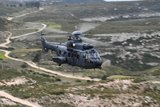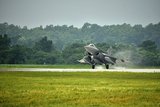F-35 ’ten-point disadvantage’ is a Canadian government matter, says Lockheed
Lockheed Martin has responded to claims that the F-35 faces a considerable competitive stumbling block if it is to win Canada’s C$15 billion-C$19 billion ($11 billion-$14 billion) Future Fighter Capability Project (FFCP).
It is understood that the fifth-generation aircraft will be subject to a ’10-point disadvantage’ during evaluations which commenced after RfP submissions from industry were handed over to Public Service and Procurement Canada on 31 July.
The penalty is said to be a consequence of Joint Strike Partnership programme terms preventing the F-35 offer to Canada being able to ‘guarantee economic offsets', according to David Perry, VP at
Already have an account? Log in
Want to keep reading this article?
More from Air Warfare
-
![Focus on economy over capability highlights the cost imperative for CCA success]()
Focus on economy over capability highlights the cost imperative for CCA success
Striking the right balance between cost and capability is likely to become more crucial in the increasingly competitive collaborative combat aircraft market. Shephard’s special CCA market report examines where the opportunities lie for suppliers.
-
![France and India secure long-term defence roadmap built on shared production]()
France and India secure long-term defence roadmap built on shared production
Expanded fighter jet and missile production, next-generation engine cooperation and helicopter assembly deals have all been struck between the two countries, signalling a strengthening bilateral partnership between France and India.
-
![L3Harris begins work on South Korean AEW&C aircraft, eyes further international opportunities]()
L3Harris begins work on South Korean AEW&C aircraft, eyes further international opportunities
The company remains upbeat about its Indo-Pacific and European prospects, with its AERIS X system onboard a Bombardier 6500 proving an attractive option for air forces’ growing AEW&C needs.
-
![Saudi Arabia air report: The world’s fourth-largest UAV market seeks to strengthen domestic industry]()
Saudi Arabia air report: The world’s fourth-largest UAV market seeks to strengthen domestic industry
With $9.18 billion in uncontracted programmes — including a potential multi-billion-dollar MQ-9B deal — Saudi Arabia’s UAV sector is poised for significant further growth and industrial expansion.
-
![AI mission-autonomy software integration and partnerships see progress across CCA efforts]()
AI mission-autonomy software integration and partnerships see progress across CCA efforts
The successful integration of third-party mission autonomy in the US Air Force’s CCA programme and movement on Helsing’s Europa CA-1 timelines mark key milestones in the development of uncrewed aerial capabilities.























